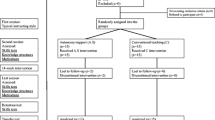Abstract
Previous research indicated that physically disabled children have a low self-efficacy and perceive less control over their own performance than other children. Problem-based learning (PBL) is an educational approach that emphasizes interpersonal skills, self-directed learning and problem-solving skills. Acquiring these skills has been demonstrated to increase self-efficacy. This study examined whether the use of PBL would increase self-efficacy and school-related attitudes in physically disabled teenagers. In a quasi-experimental design, 29 physically disabled teenagers received a 9-week geography course in PBL format or their usual geography education. Contrary to our hypothesis, no positive effects of PBL were found and the PBL group even showed a significant decrease in learning-related self-esteem, as compared with the controls. A possible explanation is that the PBL course was too short and not integrated in the whole curriculum. The results emphasize the importance of experimentally testing the effects of new educational methods for use in other populations then the population for which positive results have been reported (university students). This seems particularly true in special populations such as physically disabled children. Additionally, carefully monitoring the implementation process seems especially important here.
Similar content being viewed by others
References
Agbor, B. W., Gordon, P. R., and Harper, E. T. (2000). The value of problem-based learning as an orientation tool. Acad. Med. 75(6): 567.
Albanese, M. A., and Mitchell, M. A. (1993). Problem-based learning: A review of literature on its outcomes and implementation issues. Acad. Med. 68(1): 52–81.
Bandura, A. (1977). Self-efficacy: Toward a unifying theory of behavioral change. Psychol. Rev. 84(2): 191–215.
Birgegard, G., and Lindquist, U. (1998). Change in student attitudes to medical school after the introduction of problem-based learning in spite of low ratings. Med. Educ. 32: 46–49.
Block, S. D. (1996). Using problem-based learning to enhance the psychosocial competence of medical students. Acad. Psychiatry 20(2): 65–75.
Boekaerts, M. (1996). Personality and the psychology of learning. Eur. J. Personality 10: 377–404.
Bosscher, R. J., Smit, J. H., and Kempen, G. I. J. M. (1997). Algemene competentieverwachtingen bij ouderen: Een onderzoek naar de psychometrische kenmerken van de Algemene Competentieschaal (ALCOS) (General competence expectations of elderly people: A investigation into the psychometric characteristics of the General Competence Scale). Nederlands tijdschrift voor de psychologie 52: 239–248.
Cadman, D., Boyle, M., Szatmari, P., and Offord, D. R. (1987). Chronic illness, disability, and mental and social well-being: Findings of the Ontario Child Health Study. Pediatrics 79(5): 805–813.
Kazdin, A. E., Rodgers, A., and Colbus, D. (1986). The hopelssness scale for children: Psychometric characteristics and concurrent validity. J. Consult. Clin. Psychol. 54(2): 241–245.
Khoo, H. E. (2003). Implementation of problem-based learning in Asian medical schools and students’ perceptions of their experience. Med. Educ. 37(5): 401–409.
Kunnen, E. S. (1992). Mastering (with) a handicap: The development of task-attitudes in physically handicapped children. Unpublished doctoral dissertation, University of Groningen, The Netherlands.
Kunnen, E. S. (1993). Attributions and perceived control over school failure in handicapped and non-handicapped children. Int. J. Behav. Dev. 16(1): 113–123.
Norman, G. R., and Schmidt, H. G. (1992). The psychological basis of problem-based learning: A review of the evidence. Acad. Med. 67(9): 557–565.
Oatley, K., and Nundy, S. (1998). Rethinking the role of emotions in education. In Olson, D. R., and Torrance, N. (eds.), The Handbook of Education and Human Development, Oxford: Blackwell Publishers Ltd, pp. 257–274.
Palmer, S. B., and Wehmeyer, M. L. (1998). Students’ expectations of the future: Hopelessness as a barrier tot self-determination. Mental Retard. 36(2): 128–136.
Sherer, M., Maddux, J. E., Mercandante, B., Prentice-Dunn, S., Jacobs, B., and Rogers, R. W. (1982). The self-efficacy scale: Construction and validation. Psychol. Rep. 51: 663–671.
Schmidt, H. G. (1993). Foundations of problem-based learning: Some explanatory notes. Med. Educ. 27(5): 422–432.
Schmidt, H. G., and Moust, J. H. C. (1999). A taxonomy of problems used in problem-based curricula. In van Merriënboer, J., and van Moerkerke, G. (eds.), Instructional Design for Problem-Based Learning: Proceedings of the Third Workshop of the EARLI SIG Instructional Design, Maastricht: Datawyse, pp. 3–12.
Schmidt, H. G., and Moust, J. H. C. (2000). Factors affecting small-group tutorial learning: A review of research. In Eversen, D. H., and Hmelo, C. E. (eds.), Problem-Based Learning: A Research Perspective on Learning Interactions, Mahwah, NJ: Lawrence Erlbaum (pp. 19–52).
Vorst, H. C. M. (1990). Handleiding and verantwoording bij de SchoolVragenLijst. [Manual] Nijmegen: Berkhout.
Wiers, R. W., van de Wiel, M. W. J., Sá, H. L. C, Mamede, S., Tomaz, J. B., and Schmidt, H. G. (2002). Design of a problem-based curriculum. A general approach and a case study in the domain of public health. Med. Teacher 24: 45–51.
Zimmerman, B. J., and Lebeau, R. B. (2000). A commentary on self-directed learning. In Eversen, D. H., and Hmelo, C. E. (eds.), Problem-Based Learning: A Research Perspective on Learning Interactions, Mahwah, NJ: Lawrence Erlbaum, pp. 299–314.
Author information
Authors and Affiliations
Corresponding author
Rights and permissions
About this article
Cite this article
Könings, K.D., Wiers, R.W., van de Wiel, M.W.J. et al. Problem-Based Learning as a Valuable Educational Method for Physically Disabled Teenagers? The Discrepancy Between Theory and Practice. J Dev Phys Disabil 17, 107–117 (2005). https://doi.org/10.1007/s10882-005-3683-6
Issue Date:
DOI: https://doi.org/10.1007/s10882-005-3683-6




